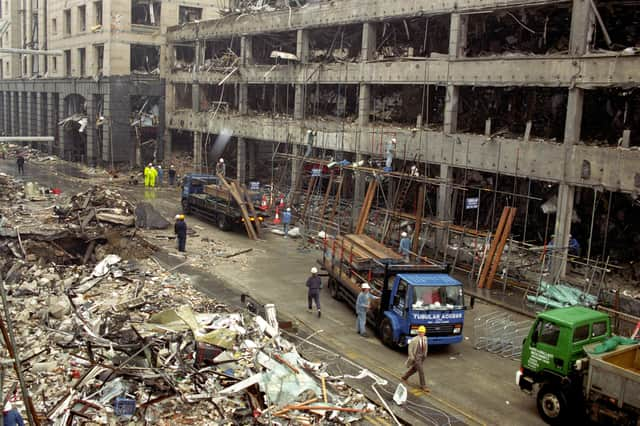Declassified files: Murderous IRA bombings brought fears of empowering ‘Tory right-wing’


The Bishopsgate bomb, which was planted in a stolen truck, killed one person and injured 44.
It caused widespread destruction in the City of London, causing millions of pounds worth of damage.
Advertisement
Hide AdAdvertisement
Hide AdThe Warrington bombing caused the deaths of three-year-old Jonathan Ball and 12-year-old Tim Parry, with 54 people injured by the explosion in the Cheshire town.
In an official communication between Counsellor Joe Hayes to Assistant Secretary Sean O hUiginn dated April 27 1993, Mr Hayes described the feeling in Westminster in the wake of the attacks.
“Reaction at Westminster is likely to follow a predictable pattern,” he writes, a couple of days after the blast at Bishopsgate.
“The bombings will undoubtedly surface during the coming week, probably at Prime Minister’s questions and the Tory right-wing will press their predictable demands for an enhanced security response.
Advertisement
Hide AdAdvertisement
Hide Ad“This time round, however, the usual voices may be stiffened by the addition of some London-based MPs and, behind the scenes, by powerful voices who represent the interests of various financial institutions in the City of London.
“In the case of London, much is made of the city’s ability to absorb the danger and inconvenience of terrorist threat.
“Similarly, the City of London easily coped with the financial loss of last year’s bombing at the Baltic Exchange. Reaction to this weekends events should, therefore, not be overstated. Nevertheless, the sheer size of the Bishopsgate bombing puts it in a different league from the usual incident and has added to the sense that something must be seen to be done.
“London-based Conservative MPs and the lobby representing the financial interests of the City of London, constitute powerful pressure points within the Conservative Party whose views the Government cannot easily afford to ignore.
Advertisement
Hide AdAdvertisement
Hide AdIn a separate communique in the aftermath of the Warrington blast, which led to widespread public anger, Ambassador to Great Britain Joseph Small compared the reaction to the killings in Warrington to those in Northern Ireland.
Describing a recent exchange between Liberal Democrats leader Paddy Ashdown and Prime Minister John Major in the House of Commons, Mr Small writes on April 1: “It underlines one well-known fact – when measured against the reaction to terrorist killings in Britain, deaths in Northern Ireland do not count for much.
“Despite the fact that they had taken place earlier that day, no reference was made to the multiple killings at Castlerock,” he says, referring to the killing of four Catholics by the Ulster Freedom Fighters.
“This omission was reflected in the popular press,” he continues.
Advertisement
Hide AdAdvertisement
Hide Ad“In a week dominated by images from Warrington there was simply no room for coverage of, or editorial indignation at, the horrific killings in Northern Ireland.”
In the same letter, Mr Small suggested that the murder of Merseyside toddler James Bulger had “coloured” some of the reaction to the Warrington blast.
“Both events became inextricably linked in the public mind, adding to the sense of insecurity and concern here about the apparent collapse of public order and morality.”
The Ambassador offers a frank assessment of what the Warrington bombing means for British politics, warning that it will in the short-term strengthen “the hand of the right wing law and order lobby”.
Advertisement
Hide AdAdvertisement
Hide AdIn a lengthy missive that updates officials in Dublin on what the blast means for attitudes to both the Irish community in England and the Irish Government, Mr Small mused that there was some signs of optimism.
He said the reaction in the media and among the public indicates that “most thinking British people no longer blame their Irish neighbours for the IRA”.
——— ———
A message from the Editor:
Thank you for reading this story on our website. While I have your attention, I also have an important request to make of you.
With the coronavirus lockdowns having had a major impact on many of our advertisers — and consequently the revenue we receive — we are more reliant than ever on you taking out a digital subscription.
Advertisement
Hide AdAdvertisement
Hide AdSubscribe to newsletter.co.uk and enjoy unlimited access to the best Northern Ireland and UK news and information online and on our app. With a digital subscription, you can read more than 5 articles, see fewer ads, enjoy faster load times, and get access to exclusive newsletters and content.
Visit
now to sign up.
Our journalism costs money and we rely on advertising, print and digital revenues to help to support them. By supporting us, we are able to support you in providing trusted, fact-checked content for this website.
Ben Lowry, Editor